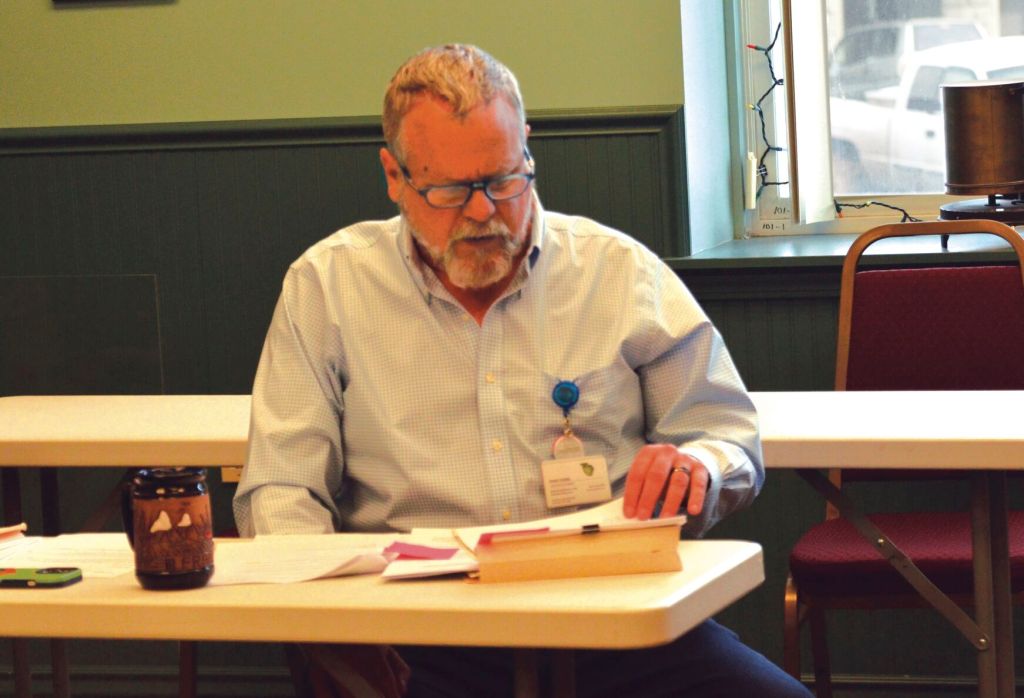County OKs workforce housing in newly amended zone
Published 11:00 am Friday, March 18, 2022

- Wallowa County Planning Director Franz Goebel reads findings accompanying an amendment to the county’s Comprehensive Land Use Plan before the county commissioners adopted it at their meeting Wednesday, March 16, 2022.
ENTERPRISE — Wallowa County has updated its rural service zone to allow a new type of workforce residential development with the approval Wednesday, March 16, of an amendment to its Comprehensive Land Use Plan.
The Wallowa County Board of Commissioners held a public hearing to approve two amendments to the Comprehensive Plan during the board’s regular meeting. One amended Goal 9, Economy of the Area, by updating the Economic Opportunity Analysis. The other amended the rural service zone, to support the findings of that analysis.
“The short of this is you had a rural service zone where a dwelling was an outright use,” Commission Chairwoman Susan Roberts said.
That made it primarily a residential zone, instead of a zone to support economic development. Planning Director Franz Goebel noted that the Economic Opportunity Analysis stressed both a severe lack of workforce housing and a need for more commercial uses allowed. This amendment includes a provision to help address these needs.
The Economic Goal 9 update was deemed necessary following the 2019 Legislature’s approval of Senate Bill 2 relating to employment opportunities in Eastern Oregon, according to the Legislature’s website. The bill allows listed Eastern Oregon counties that undertake economic opportunity analysis to designate up to 50 acres outside urban growth boundaries for industrial and other employment uses notwithstanding statewide planning goals related to agriculture, forest use or urbanization. The bill excludes high-value farmland and requires county coordination with the state forester and nearby cities.
The county commissioners addressed the next step by amending the rural service zone to allow more comprehensive commercial uses including workforce housing.
During their discussion March 16, the commissioners agreed there are properties near Joseph, Wallowa and Enterprise that might benefit from the uses allowed in the newly amended zone.
Commissioner Todd Nash recused himself from discussion and voting upon the new ordinances. He said that because of property he owns in the county, there’s the potential for a conflict of interest. Commissioner John Hillock said he also owns a “small piece of property that could potentially be affected by this zone, but it’s completely developed,” so he saw no conflict of interest for himself.
The changes
“The rural service zone is presently an option for any nonresource zoned property and will continue to be,” Goebel explained to the commissioners. “To utilize the rural service zone, a landowner would first apply through the public hearing process for a zone change. If approved, zone permits would be required prior to any development.”
But in amending the old rural service zone, the Planning Commission wanted to be more specific as to what uses are allowed. Goebel said the commission wanted to make sure the zone is focused on commercial uses and that it does not “become a de facto residential zone. It was a commercial zone; it just wasn’t very fleshed out in the types of commercial and light industrial uses.”
During the public comment portion of the hearing, Joseph resident Milley O’Callaghan asked if grazing and timber harvest would be allowed in the new version of the rural service zone and if bed-and-breakfasts would be allowed.
“Timber and grazing uses are still allowed in this zone,” Goebel said, but added that no short-term rentals or bed-and-breakfasts would be.
He emphasized that the old version of the rural service zone has been viewable on the county’s website for several years and the amended version has been available in the Planning Office for a couple of months for the public to review.
“This amendment will not affect any existing property owners upon approval,” Goebel said.
Property owners still need to apply for a zone change prior to taking advantage of proposed allowable uses.
“Updating the rural service zone also provides new conditional uses to address the shortfall in available workforce housing as identified in the EOA (economic opportunity assessment),” he said.





